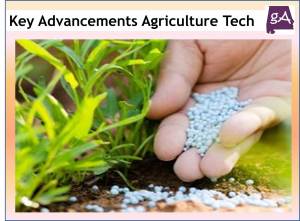
Farming has come a long way, and it only continues to advance as the demand for food continues to increase worldwide. Through the engineering of chemicals, robotics, and more, the agricultural industry has been a constant driving force behind many innovations. Let’s take a look at a few of the key advancements in agriculture technology to get a better idea of what modern farming looks like.

Robotics
One of the more recent innovations in the field of agriculture is robotics. Current agricultural robots are small, used as planters that sow fields and potentially acting as replacements for traditional petroleum-based planters. Such innovation promises a more environmentally friendly way of planting crops. It’s significant because it not only lessens the impact on the environment but also ensures that we can grow crops more healthily and that they’re healthier for our consumption.
Chemicals
There has been a lot of controversy surrounding chemicals used in agriculture, but this is borne primarily from misinformation and ignorance. Many of the innovations in agricultural chemicals revolve around providing plants with the nutrients they need to grow healthy and strong. For instance, formaldehyde has been instrumental in developing key advancements in agriculture technology, from pesticides to fertilizers. Formaldehyde has played a critical role in both protecting and providing for crops. As a fertilizer, formaldehyde releases a steady amount of nitrogen—a crucial nutrient in the growth of plants—which has vastly improved the efficiency and quality of crop growth. Our crops have never been safer to eat or more bountiful than with these chemical innovations.
Soil Sensors
Soil and water sensors have been invaluable for streamlining the farming process. Such monitoring technology helps farmers conserve water and reduce costs by giving accurate measurements of when the soil requires water so that farmers can water crops only when necessary. These sensors further benefit us by preventing erosion and reducing the amount of fertilizer that makes its way into lakes and streams as a side effect of irrigation practices. Furthermore, soil sensors measure the amount of nitrogen within the soil and help farmers determine when they need to add more fertilizer. In the end, such sensors help farmers gain greater control over their farms so that they can further optimize the farming process.
Categories: Interesting Stuff





